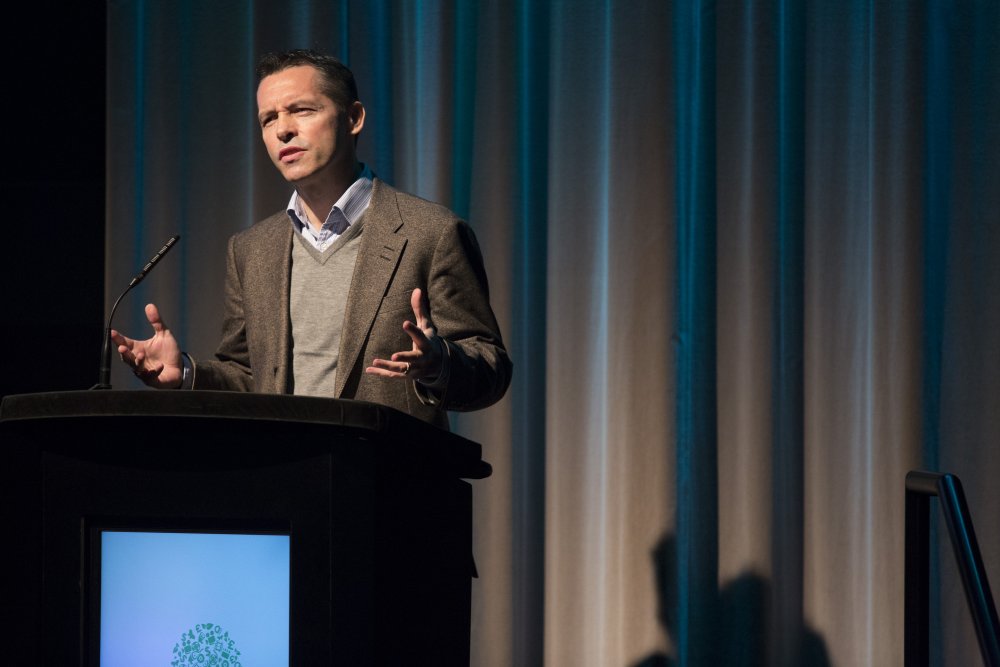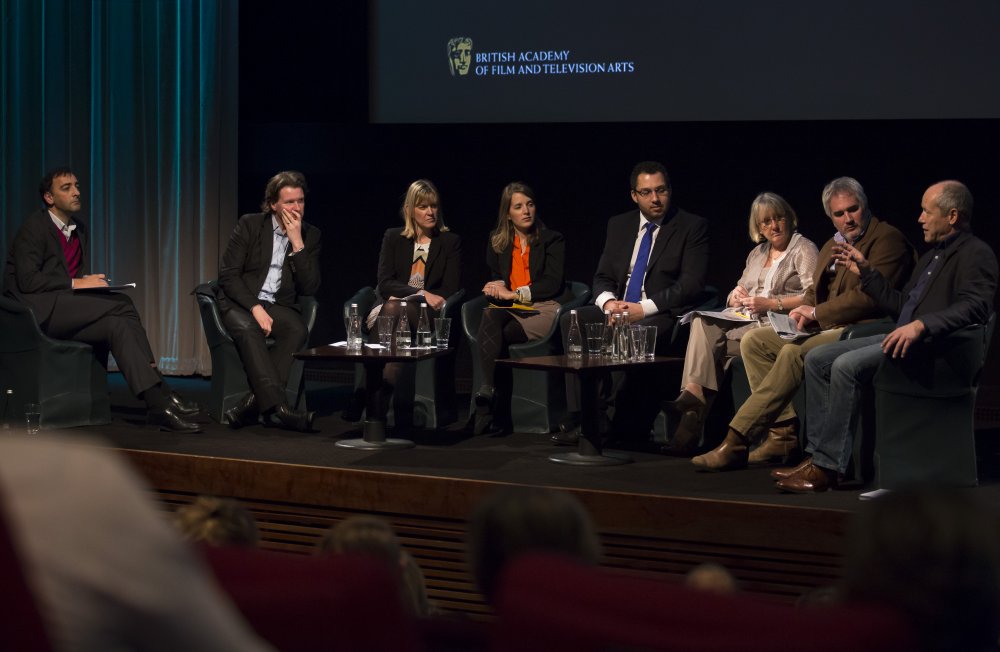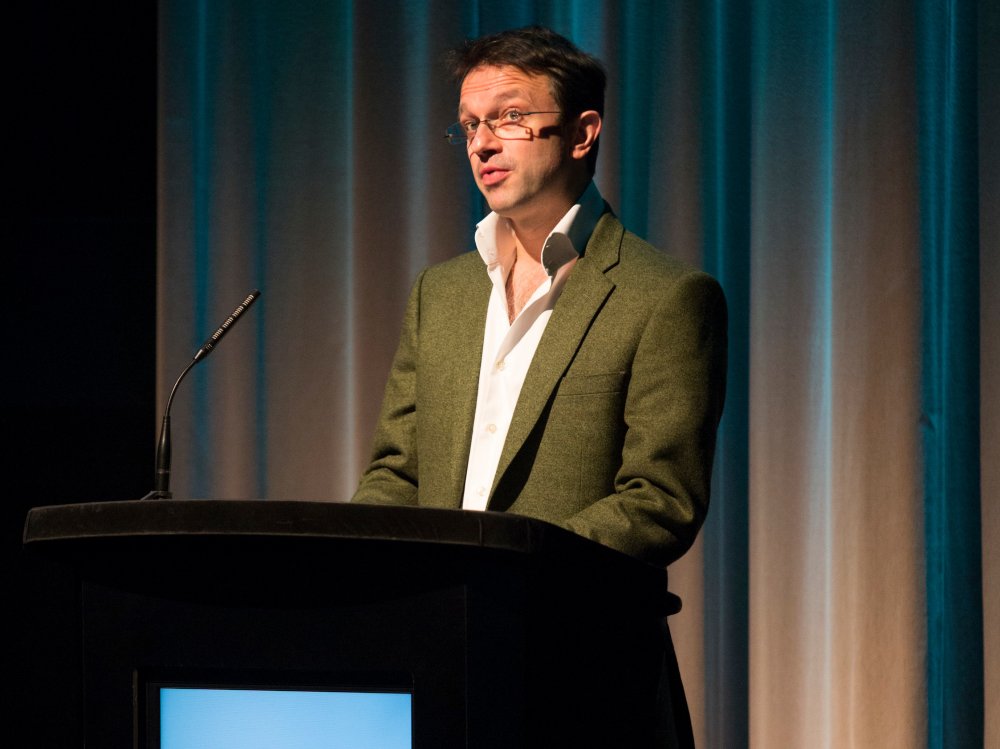
Tim Cagney, Deputy CEO, BFI
Some of the most influential figures from the film, television and games industries gathered on Monday 12 November at the British Academy of Film and Television Arts (BAFTA) in London for a special event designed to explode the myth that sustainable production needs to be costly and impractical.
Senior executives from organisations including the BBC, ITV, Sky, Microsoft, Sony and Warner Bros attended “Greening the Screen: taking steps to a sustainable future”. The event included a panel event led by actor and green campaigner Alistair McGowan plus keynote speeches from Kevin Price, Chief Operating Officer at BAFTA, who gave an update on the progress of Albert – the UK’s first carbon calculator for the film and television industry – a year after launch, and Tim Cagney, Deputy CEO of the BFI, who affirmed the BFI’s commitment to leading and coordinating a UK-wide sustainability strategy for all parts of the UK’s film sector.
Created by the BBC, Albert was officially launched in November 2011 as a free online tool (www.myalbert.co.uk) administered by BAFTA and run with the support of a cross-industry consortium consisting of television production houses and broadcasters: BBC, Boundless, Channel 4, Endemol, IMG, ITV, Kudos, Shine, Sky and Twofour. One year later, Albert has 800 registered users from over 50 television companies and has gathered data from 266 productions, totalling 1,297 hours of output.
Deputy CEO of the BFI, Tim Cagney outlined the various measures the BFI is embracing as part of its commitment to leading the adoption of sustainable practices within the film industry. The BFI is leading a UK-wide Sustainability Group made up of representatives from right across the film industry, including studios, trade organisations, national and regional partners. It has also undertaken a full audit of its own sustainable practices across every area of the organisation, from BFI National Archive facilities at Berkhamsted and the state-of-the-art, environmentally sustainable and architecturally pioneering film storage facility at Gaydon, Warwickshire, to BFI Southbank, and its HQ at London’s Stephen Street, and the BFI has adopted BS 8909, the British Standard for film industry sustainability it launched in Cannes in 2011. The BFI is now actively encouraging other film organisations to do the same.

Left to right: Alistair, Richard Smith, Mary-Anne King, Laura Steele, Kieren Mayers, Sally Debonnaire, Dan Dark and John Newbigin
Credit: BAFTA/Ed Miller
During the Greening the Screen event, Kevin Price, Chief Operating Officer at BAFTA, announced that Albert is now suitable for use by film as well as television productions, and revealed that data collected from Albert shows that the production of each hour of on-screen content is responsible for an average of 5.8 tonnes of carbon dioxide (CO2) emissions. This is equivalent to the emissions of one UK citizen at work in one year. A report published to coincide with the event found that the most significant carbon impacts are associated with travel (38% of emissions) and the production office (30% of emissions). The findings from the first year will be benchmarked against future years to assess what improvements are being made.
The BFI has refreshed and updated the www.greeningfilm.com website, integrating the Albert carbon calculator. Greeningfilm.com is now the go-to online resource for film industry professionals who want to minimise negative environmental impacts, providing practical case studies, examples of best practice and signposting to a variety of key support services to make adoption of sustainable practices as simple and streamlined as possible.
The BFI has also convened and leads the industry-wide sustainability group, uniting organisations from every area of the film value chain to share best practice and coordinate activity in order to maximise benefit. Sustainability Group members include Pinewood, BAFTA, BECTU, the Cinema Exhibitors’ Association, Creative Skillset, the Mayor of London’s Office, National Screen Agencies, Directors UK, Film Export UK, Equity, the Production Guild, Film London and others, and the group welcomes and encourages new members who can bring new perspectives.

Kevin Price, Chief Operating Officer, BAFTA
Kevin Price, Chief Operating Officer at BAFTA, said:
As chair of the Albert consortium, BAFTA is delighted that the television production community, and now the film sector, have so enthusiastically engaged with this tool in its first year. The data captured so far has highlighted the key areas where the industry can work to reduce its carbon footprint, and will provide a useful benchmark from which to measure improvements over time. We look forward to continuing to support these companies in the pursuit of excellence, and to welcoming further engagement with Albert from the film, and also games, industries.
Tim Cagney, Deputy CEO of the BFI, said:
The adoption of more sustainable business practices across the film industry is not just desirable; it is – now more than ever before – essential, and as yesterday’s event highlighted, adapting our approach to make our work more sustainable needn’t be an onerous task. The BFI as the UK’s lead organisation for film is absolutely committed to driving forward the sustainability agenda, which is why we are currently implementing a BS 8909 sustainability management system across our business, greeningfilm.com has become the go-to sustainability tool to support the UK film industry, and we are working closely with partners from across the sector in the film industry Sustainability Group.
At Greening the Screen, actor and green campaigner Alistair McGowan chaired a lively panel discussion with leading figures from film, TV and games, representing organisations including Warner Bros, the BBC, ITV, Sky, Microsoft and Sony. Speakers shared the latest thinking on sustainable production and examples of business practices that are low impact in terms of carbon, finance and time.
Environmental management consultancies Greenshoot and Eco Consultancy presented case studies that brought to life in practical terms how companies adopting BS 8909 – the comprehensive standard for ‘sustainability management’ in the film industry – can switch to more sustainable ways of working without setting unrealistic goals or creating unnecessary administrative burden.
Greenshoot’s Co-founder and Managing Director Melanie Dicks explained how BS 8909 was used during the production of Gambit, Les Misérables, and Anna Karenina to help save money while minimising the impact of the productions on the local environment.
The conference was followed by a trade fair which showcased range of “green” products and services.






